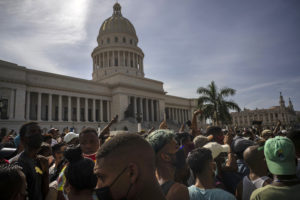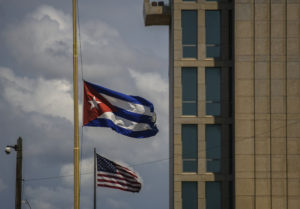On Friday, August 14, I stood on the lawn at the residence of the chief of the U.S. Embassy in Cuba, and watched as Marines raised the American flag. It was a moving moment. As the flag went up, the crowd–U.S. diplomats, invited guests from the United States, diplomats from Europe and Latin America, and a diverse group of Cubans–applauded.
After 54 years, the United States had an embassy and direct diplomatic representation in Cuba. A long era–in which our efforts to isolate Cuba resulted in alienating ourselves from the rest of the hemisphere–had come to an end. A more hopeful period, though with its own unique set of challenges, was beginning.
SEE ALSO: Reforms in 21st Century Cuba
As I stood on the lawn, I was proud that our country had turned a corner, and was embarking on a more mature relationship with Cuba. And I was pleased that, twenty years after I had first visited the building on the Malecon that houses U.S. diplomats and consular officials, it was no longer an “Interest Section” formally under the care of the Swiss government, but a full-fledged embassy.
I wasn’t the only one who was pleased. I stayed in Havana for four days, taking advantage of the flag raising ceremony to meet with Cuban colleagues. I talked to friends and colleagues, as well as to taxi drivers, and people on the street in the Vedado neighborhood where I was staying. Uniformly, Cubans welcomed the normalization of relations. People smiled when I said I was there for the flag-raising. “The end of an era of stupidity,” one man told me, as he explained how he thought better relations would be good for the economy and the Cuban people. Most of the Cubans I talked to thought normal relations would make travel easier, for both North Americans and Cubans.
Most thought that tourism and (eventually) trade would benefit the Cuban economy, and improve the standard of living for themselves and others. But most were realistic, did not expect changes overnight, and understood that the embargo on trade and tourist travel remains in effect for the time being.
I was in Cuba in December, when President Obama and Cuban President Raul Castro announced the agreement to restore diplomatic relations. Then, Cubans were elated, and I talked to people who expected immediate improvements in their lives (my favorite was the taxi driver who told me he was going to travel to Las Vegas). This time, Cubans were happy–“contento” is the phrase I heard over and over–but recognized that improvements would take time, and that they required not just action by the U.S. government, but action by Cuba as well.
I could see, on the streets of Havana, some of the signs that economic changes were indeed underway. It’s one thing to write about the growth of the self-employed sector, the emergence of cooperative businesses, and the private sale of homes and cars. It’s another to see the “room for rent” signs sprouting everywhere, the growing number of private restaurants, and the success of a former state-owned restaurant now turned into a cooperative. And on a Saturday stroll along the Paseo del Prado, to run into a crowd of several hundred at an open air housing market, where sellers–carrying signs with descriptions and photos of their homes–met with potential buyers.
Of course, more needs to happen on the economic reform front. The government needs to make progress on the economy, particularly as it seeks to re-engage disillusioned young people. The new private and cooperative sector needs more access to wholesale markets if it is to succeed. The Cuban government needs to figure out how to take advantage of the opening that the Obama administration has created for imports and exports to the private sector. And the government needs to address bigger problems like currency reform, and how to attract needed foreign investment in priority areas in the state sector. But these problems shouldn’t blind us to the fact that major changes have already taken place.
These changes–those that have taken place and those yet to come–are going to pose challenges, of course. As Cuba moves toward a more mixed economy, income inequality will likely increase, and the financing of the universal social services for which Cuba is famous–especially its free education and health care–will be complicated. As the private sector grows, and foreign investors are involved in the public sector, there will be new questions about labor relations and workers’ rights. Debates about social policy, social services, and how to respond to inequality in Cuba are just beginning.
On the political front, change has been slow. Cuba’s human rights record continues to be deeply flawed. It is not going to become a multi-party electoral democracy in the immediate future, and unacceptable and unnecessary restrictions on freedom of speech and freedom of association are likely to continue.
Still, changes are happening. The space for political debate on the island is widening, nurtured by some church groups, academics, and others in civil society, and with greater tolerance from officials than in the past. As economic and social changes move forward, there will be new debates about political change. Internet access has been growing in Cuba, and with it, access to much broader sources of information (The Cuban government has publicly committed to a goal of ensuring that 50 percent of all Cuban households have internet access by 2020). President Raul Castro has announced that he will honor recently established term limits, and retire in 2017. The Communist Party, in the lead up to a conference next year, is discussing electoral reforms and constitutional changes.
There are some important debates pending on the island, and much work remains to be done on both sides of the Florida Straits to fully normalize relations. In the United States, we need to do the education and advocacy that will bring the embargo to an end. In the meantime, I believe that reopening diplomatic ties will benefit both countries, and allow us to discuss our differences in a civilized manner. With all of the changes on the horizon, I look forward to seeing what the coming years will hold, both for everyday Cubans and for U.S.-Cuba relations.


